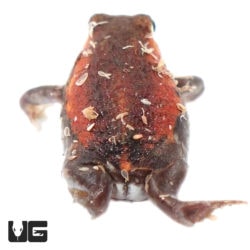Reveal Rare Rain Frog for Sale: Elevate Your Amphibian Collection Today!
Reveal Rare Rain Frog for Sale: Elevate Your Amphibian Collection Today!
Blog Article
Common Wellness Issues in Reptiles: Signs And Symptoms and Solutions
In the detailed world of reptile treatment, understanding the usual health and wellness issues that may influence these special animals is vital in ensuring their wellness. Whether it's grappling with parasitical invasions, navigating dehydration worries, or addressing skin conditions that show up in subtle methods, being attuned to the signs and symptoms and furnished with the expertise of effective options is important for any kind of reptile proprietor.
Respiratory System Infections
Breathing infections in reptiles can substantially affect their overall health and call for punctual interest from skilled veterinarians. In reptiles, respiratory infections can be especially testing to detect and treat due to their unique makeup and physiology.
Therapy for respiratory infections in reptiles typically entails a mix of helpful treatment, such as maintaining proper moisture levels and temperature level gradients in the enclosure, along with targeted medicine to address the details microorganism responsible for the infection. It is critical for reptile owners to check their family pets closely for any type of signs of respiratory system distress and seek vet treatment at the earliest indicator of a concern. With timely intervention and proper treatment, lots of reptiles can recover completely from respiratory infections and resume regular activities.

Metabolic Bone Disease
What aspects add to the growth of Metabolic Bone Disease in reptiles?
Metabolic Bone Illness (MBD) in reptiles is mostly triggered by an absence of proper calcium, phosphorus, and vitamin D3 levels in their diet. When reptiles do not get appropriate calcium, either with their food or proper UVB exposure for vitamin D3 synthesis, they are at a high danger of establishing MBD. Reptiles with diet regimens reduced in calcium or unbalanced calcium to phosphorus proportions are specifically susceptible. Furthermore, poor exposure to UVB light avoids reptiles from synthesizing vitamin D3, which is essential for calcium absorption and bone wellness.
Insufficient moisture degrees can likewise influence a reptile's capability to metabolize calcium efficiently. Normal veterinary exams, proper husbandry techniques, and a balanced diet regimen are vital to prevent Metabolic Bone Illness in reptiles.
Parasitical Invasions
Parasitical infestations posture a substantial health and wellness risk to reptiles, impacting their total well-being and needing prompt veterinary interest. Reptiles can be influenced by various bloodsuckers, consisting of mites, ticks, interior worms, and protozoa. These bloodsuckers can create a variety of signs and symptoms, such as weight management, sleepiness, skin irritation, looseness of the bowels, and also fatality if left neglected.
One typical bloodsucker found in reptiles is the mite, which can trigger skin stress, inflammation, and anemia. Ticks are another external parasite that can cause and transfer illness pain to the reptile. Inner bloodsuckers like worms and protozoa can bring about digestive issues, poor nutrition, and compromise the reptile's immune system.
To identify a parasitic invasion, a veterinarian may carry out fecal tests, skin scrapings, or blood tests. Treatment frequently involves deworming medications, antiparasitic bathrooms, or in extreme instances, a hospital stay. Preventative procedures such as routine veterinary check-ups, proper health, and quarantine treatments for brand-new reptiles can assist reduce the risk of parasitical problems and make sure the health of reptile pets.
Dehydration and Hydration Issues
Dehydration in reptiles can considerably impact their wellness and health, requiring timely treatment and proper hydration administration. Reptiles are prone to dehydration due to numerous aspects such as insufficient water consumption, high ecological temperatures, and particular wellness conditions. Signs and symptoms of dehydration in reptiles consist of sunken eyes, lethargy, loss of skin flexibility, and decreased urination. If left untreated, dehydration can result in significant wellness issues and even be deadly to the reptile.
To prevent dehydration, reptile proprietors should make sure that their pets have accessibility to tidy water whatsoever times. The water recipe ought to be big sufficient for the reptile to take in if required, specifically for species that take in water via their skin. Additionally, preserving correct humidity levels in the reptile's unit and providing routine bathrooms can aid prevent dehydration.
In situations of dehydration, it is essential to seek vet treatment without delay. A veterinarian may provide liquids either by mouth or via injections to rehydrate the reptile. It is necessary to attend to the underlying source of dehydration to avoid reoccurrence and ensure the reptile's overall health.
Skin Conditions

Verdict

Respiratory infections in reptiles can significantly influence their overall wellness and need punctual attention from knowledgeable veterinarians (rain frog for sale). Preventative actions such as regular vet check-ups, appropriate hygiene, and quarantine procedures for brand-new reptiles can assist decrease the danger of parasitical infestations and make certain the well-being of reptile pet dogs
If left neglected, dehydration can lead to significant health and wellness concerns and even be deadly to the reptile.
Routinely checking your reptile for any modifications in skin appearance, appearance, or color can help in very early detection and treatment of skin conditions, advertising the overall health and wellness of your scaly friend. - rain frog for sale
In conclusion, reptiles are susceptible to different look what i found wellness issues such i was reading this as respiratory infections, metabolic bone illness, parasitic infestations, dehydration, and skin conditions.
Report this page